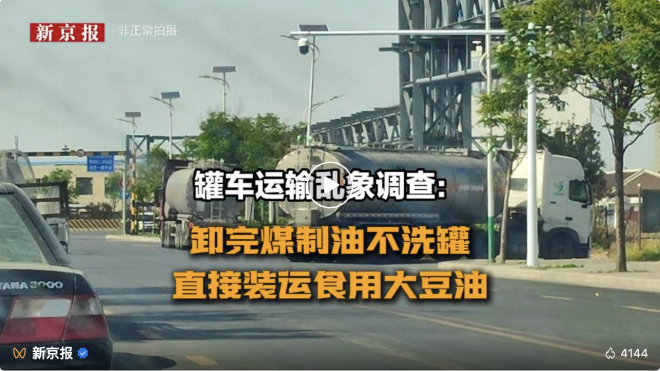by Zhong Jiping
Investigative journalism has many definitions, but it is widely regarded as “critical and in-depth journalism” that serves as a cornerstone of a transparent and accountable society.
However, in today’s digital age, the rapid rise of social media is often seen as a challenge to traditional journalism—especially investigative reporting. How can investigative journalists navigate this evolving landscape while maintaining their role as the “voice of society”? More importantly, how can they continue to make a real impact? At the Home of Journalists, we offer some insights.
Reflecting Public Concerns and Pushing for Viable Solutions
During China’s recently concluded Two Sessions, the country’s largest annual political event, a representative from the Supreme People’s Court announced at a press conference that procuratorial organs had filed public prosecutions in the “Tanker Truck Transporting Edible Oil” case.
This marks the latest development in a major public-interest case uncovered by investigative journalists last year. It also serves as a real-world example of the impact investigative journalism can have today.

To break the story, journalists from The Beijing News traveled over 8,000 kilometers to gather evidence. But they went beyond merely exposing the issue—interviewing more than 10 experts to uncover the root cause and proposing viable solutions in their report.
Their investigation led to an official probe by regulators, the introduction of new regulations, and judicial proceedings.
This case highlights that identifying public concerns is only the first step in investigative journalism. To drive real change, journalists must go beyond exposing problems—they must consider the broader social and policy implications of their reporting and advocate for actionable solutions.
By engaging experts, analyzing systemic causes, and following up on policy responses, investigative journalists can ensure their work leads to lasting improvements rather than fading as a fleeting controversy. Their reports thus strengthens social governance by fostering accountability, guiding policy improvements, and ensuring that public concerns translate into concrete actions.
Bridging Stakeholders to Push for Agreement and Efficiency
A policymaker stands on stage, watching a live on-site investigative report about a public concern. They are then questioned by a TV host about what has or hasn’t been done to address the issue, providing analysis and solutions on the spot—while their supervisor sits just below the stage.

This is a familiar scene from Wenzheng Shandong (Shandong Policy Inquiry), a popular live TV program in China’s Shandong province.
The program is widely admired for its rigorous questioning of government officials, pressing them for clear answers in real-time. But its true impact as a form of investigative journalism happens offstage: reporters dedicate time to uncovering issues that affect the public, identifying the responsible authorities, bringing them to the live program, and pushing for action.
The urgency created by the broadcast often accelerates government responses, with some policy adjustments or official meetings taking place in less than 24 hours after airing, and smooth cross-departmental cooperation are guaranteed.
Other local news outlets have adopted similar approaches, moving beyond merely uncovering problems to actively facilitating dialogue and solutions.
In Beijing, the TV program Xiangqian Yibu (One Step Further) connects citizens with regulators and lawyers to explore ways to improve their living environments.

In Chongqing, the TV column Jinri Guanzhu (Today’s Focus) investigates long-standing public concerns, identifies the responsible government authorities, and presses for solutions.

In Huzhou, Zhejiang, a multimedia column called Kan Jian (Observations) brings officials from various sectors together to discuss and resolve local issues.

Through these platforms, public concerns receive direct responses and solutions, and investigative reports feed directly into local policymaking by holding officials accountable and prompting direct engagement with public concerns.
It streamlines communication between departments, encourages timely policy adjustments, and ensures that governance remains responsive, transparent, and aligned with the needs of society.
These efforts reveal the key ingredients behind impactful investigative journalism: not just uncovering issues, but fostering dialogue, easing tensions, driving cooperation among stakeholders, and, essentially, enhances government effectiveness. The goal is to bridge differences and build trust rather than deepen divisions.
Clarifying Facts and Enhancing Public Understanding
Three years ago, live-streaming—a relatively new but rapidly growing industry worth hundreds of billions of dollars—came under scrutiny from Chinese regulators. Livestreamers who misled viewers into tipping or artificially inflated viewer counts and sales data faced penalties.
These malpractices were exposed thanks to investigative journalists. On March 15, 2022, China Central Television (CCTV) brought these deceptive practices to light during its annual 315 Gala.

Despite its name, the 315 Gala is not a celebration but a high-profile event dedicated to uncovering consumer rights abuses. Investigative reports on issues of public concern—such as food safety, internet security, and fraudulent business practices—are often the centerpiece.
The 315 Gala‘s reports have significant impact, often prompting swift responses from companies and regulators. Its extensive viewership ensures that the issues highlighted become focal points for public discourse, leading to policy changes and protected consumer rights.
Over the past three decades, the 315 Gala has covered sectors integral to daily life, including internet safety, food security, healthcare, and the automotive industry. By leveraging its broad reach, CCTV ensures that pressing issues remain in the public eye, leading to continued scrutiny and action.
This approach demonstrates how investigative journalism serves dual functions: exposing corporate misconduct and amplifying findings to drive meaningful solutions. By shedding light on malpractices and informing the public, investigative reporting not only clarifies facts and enhances public understanding but also safeguards people’s well-being, strengthens consumer confidence, and ultimately contributes to a fairer and safer society.
Investigative Journalism: A Catalyst for Social Progress
Investigative journalism is not just about exposing problems—it’s about driving real change. By reflecting public concerns, bridging differences, and clarifying facts, it fosters trust, promotes fairness, and pushes for meaningful reform. When done well, it channels public scrutiny into action, empowers social governance, enhances government effectiveness, and improves people’s livelihoods. This process has also enhanced the media’s reach, influence, and credibility.
